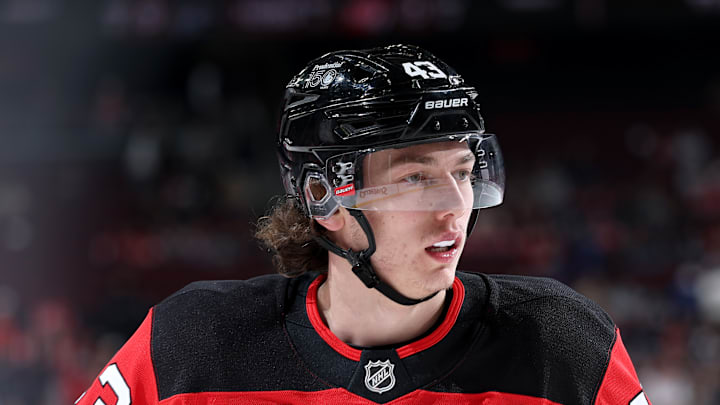Luke Hughes is playing a dangerous game, navigating the fine line between securing his perceived value and alienating the very franchise positioned to shape his career.
The New Jersey Devils opened training camp last week without Hughes, who was conspicuously absent amid an ongoing contractual dispute.
At just 22 years old, Hughes is coming off a 44-point season (7 goals, 37 assists) despite missing 11 games to start the season. With his entry-level deal now expired, he enters 10.2.c restricted free agency—a designation that prevents him from pursuing an offer sheet elsewhere. In effect, his leverage is limited. That reality stands in stark contrast to unrestricted free agency, long regarded as the sport’s holy grail, where players hold full autonomy over their next destination.
There is little doubt that Hughes is both talented and integral to the Devils’ long-term vision. The more complicated question is whether his ability is enough to warrant the organization’s tolerance of the quirks—and, at times, frustrations—that come with him.
General manager Tom Fitzgerald has made clear, on multiple occasions, that re-signing Hughes remains his “No. 1 priority.” Yet history suggests that if similar disputes arise again down the line, the dynamics may unfold differently.
History Isn’t Kind To Holdouts
For all the leverage players believe they gain, the long-term track record of holdouts is checkered at best. Mikko Rantanen, for instance, withheld his services during Colorado’s 2019 training camp while awaiting a new deal. Although he eventually signed, his next extension negotiations dragged, and by then, the Avalanche’s patience had waned; the relationship ultimately ended in a trade.
An even starker precedent can be found in Sergei Fedorov’s standoff with Detroit. He held out for nearly the entire 1997–98 season following the Red Wings’ Stanley Cup triumph. Though he returned to help secure a second consecutive championship, his later negotiations with management soured. When Fedorov asked for more time to consider an extension in 2003, the Red Wings withdrew their offer entirely. Days later, he signed with the then–Anaheim Mighty Ducks, the very team that had eliminated Detroit from the postseason—a move that embittered the fanbase for decades.
Of course, many Devils fans remember the Jesper Bratt holdout. He held out for nine days during training camp in 2021. That brought stress to all future contract negotiation until he eventually signed an eight-year deal in 2023.
History suggests that organizations are willing to grant players only a short leash when it comes to difficult contract negotiations. Think of it as baseball with one fewer strike: two, and you’re out.
Hughes does not even have a new deal in place, yet his absence from camp already casts an unfavorable impression—particularly when contrasted with veterans such as Erik Johnson. A longtime member of the Colorado Avalanche, Johnson entered the offseason without a contract, yet still attended the majority of optional skates, working tirelessly in the hope of securing even the faintest opportunity. Hughes, by contrast, has chosen not to appear until his demands are met.
In an ideal world, management would unearth a player who blends Johnson’s heart and mindset with Hughes’s skill set. That, of course, is a rarity. What remains clear is that Hughes must tread carefully; should he push too far, the long-term consequences may prove detrimental to his career.
